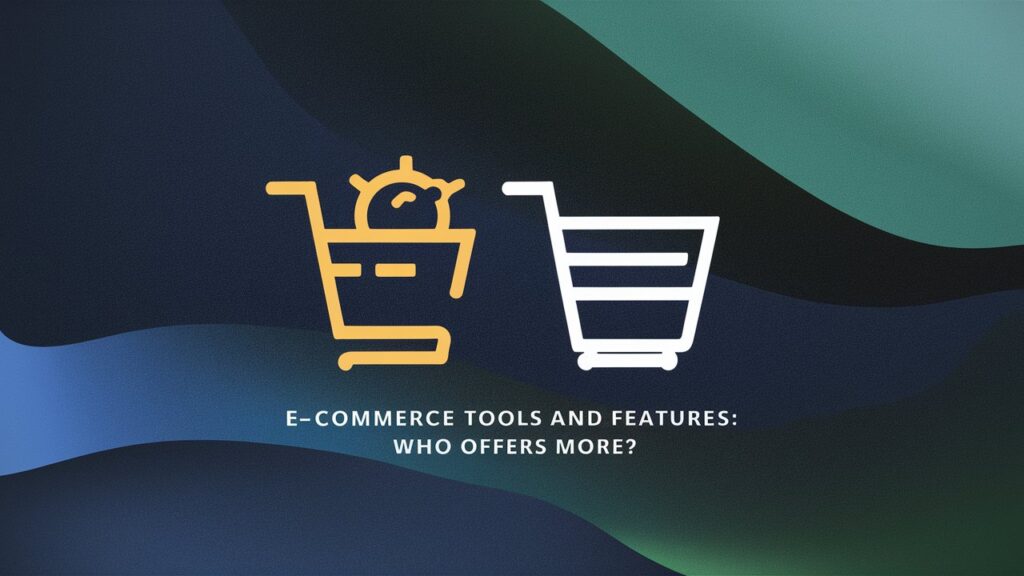Introduction to Big Cartel and Shopify
Ah, the big debate: Big Cartel versus Shopify. Both of these e-commerce giants have their own unique charms, which makes the decision slightly confusing for somebody starting out or expanding in the online store game. On one hand, Big Cartel stands as a haven for artists and small indie shops that crave simplicity and artistic control. Shopify, on the other hand, flexes its muscles with powerful tools meant for businesses on the verge of growth, catering to a wide spectrum from small startups to bustling enterprises. Selecting the right platform can dramatically shape your online venture, so buckle up as we dissect each one’s nuances to ensure that you make the perfect choice for your digital storefront.
Table of Contents
Ease of Use: Comparing the User Experience
Setting foot into a new platform can be quite a scary process, right? Fortunately, Shopify and Big Cartel have both joined in and assured the plight of any online merchant by trying to make their interface as user-friendly as possible. Shopify takes the cake in this category: it has a slick, intuitive dashboard that feels like a walk in the park when you’re setting up a shop. It’s almost tailor-made for people who aren’t all that tech-savvy, and the process of setting it up is easy with tools that are simple to use. Big Cartel is a bit rougher around the edges, but it likes to say that—minimalist, direct, great for creatives who would rather spend more time on sales and less on fiddling with complicated settings. One way or another, you will see that they both have the same mission: making your life as easy as possible to get into e-commerce.
Customization Capabilities of Big Cartel vs. Shopify
Now, let’s talk about making your store your own. Customization is where Shopify and Big Cartel start to really differ. With its huge theme store and a ton of customizable settings, Shopify provides ample opportunity to make your site just as you imagine it: fine-tune the layout, get the type right, or really tailor the way you approach online shoppers through their ever-growing app marketplace. Shopify is just as serious about customization for those who have a vision for their store. Big Cartel is less flexible, but you’ll be given plenty of tools to put personality into your shop. It’s especially handy for those who prefer a more straightforward, less cluttered approach to design. Here the right choice depends on just how much you want to tinker with your online shop’s looks and feel.
Pricing Plans: What’s Best for Your Budget?
Both Big Cartel and Shopify provide varied budget tiers that can fit different-sized businesses, but the devil lies in the details. At first glance, Big Cartel seems to be the more budget-friendly of the two, and it is much lauded, particularly by artists and small sellers for its free plan for a limited number of products. Features are a bit limited, though, when comparing with the scalable plans of Shopify. The drawback is that Shopify will look pricier at the beginning, with no free plan and more expensive monthly fees; the list of features and the ability to take care of higher volumes of sales/products is what justifies this investment. Big Cartel might be the way to go if you are on a budget and have simple needs, but the scalability of Shopify’s plans might just be worth that extra penny if you are really growth-focused.
Integrations and Add-Ons: Expanding Your Store’s Functionality
But what really makes the difference is the way these e-commerce platforms manage to make an ordinary store into a powerhouse with the integration of third-party apps. That’s where Shopify really shines. With over a thousand apps in its robust app marketplace, the sky’s the limit for augmenting its functionalities: advanced analytics tools and even complex marketing platforms. From automating your email campaigns to streamlining your shipping processes, Shopify indeed has an app for almost everything. Meanwhile, Big Cartel provides a more select set of integrations but is much more focused on quality when it makes those selections. This may look slightly limiting, but it ensures that each and every addon is likely to be just what a creative entrepreneur actually needs—without running the danger of being overwhelmed by choice. It could come down to whether you like breadth and diversity in options or are more of the artisan-focused type.
E-commerce Tools and Features: Who Offers More?

The meat of any e-commerce platform is in its tools and features. Shopify is one of the monsters in the e-commerce space, availing everything from inventory management, the ability to list unlimited products, analytic superiority, multi-channel selling capabilities, and so much more. Exactly for this reason—the ability to grow businesses, making it an extremely powerful tool for any ambitious online seller. Big Cartel keeps things simple, which is kind of a breath of fresh air if you’re overwhelmed by too many options. It’s good at the basic stuff, like product management and basic stats, but it lacks the more advanced features Shopify has. The choice here will depend heavily on your business needs: Do you need a platform that helps to grow and adapt to the expanding ambitions, or do you need a simpler tool that manages small-scale operations effectively?
Support and Resources: Getting Help When You Need It
Navigating in the digital marketplace can get tricky. Moreover, strong support can literally make or break your e-commerce experience. Shopify understands that and has its customer service available at any time, by live chat, email, and phone, and is supplemented by an array of guides, tutorials, and community forums. This whole support network is important for new users and experienced merchants who will be able to seek advice regarding their problems or ways to make their store perform better. Big Cartel is more modest in providing personalized support, though, and is only available via email. Their FAQ section and online guides are curated rather well, though, so they offer enough information that small shop owners can troubleshoot common problems for themselves. When making this choice, consider your comfort level with potential technical problems, for which accessible support can greatly ease operational stress.
Security Measures: Keeping Your Online Store Safe
No compromise on safety within the online world. Shopify comes with the most secure features out of the box. With SSL certificates across all stores compliant with PCI DSS standards, this assures protection for your customer data and business. This is what makes Shopify a trusted platform for both new entrants and established businesses. On the other hand, Big Cartel does offer some essential features for security, like SSL security; however, it does not go as far as Shopify in providing overall data protection and offering compliance. If your online store needs to maintain the highest standard for security either due to the nature of products or volume of transactions, then Shopify is likely a better bet. For the smaller shops with more lax data considerations, however, Big Cartel’s security provisions are usually sufficient.
Scalability: Which Grows with Your Business?
“In case you are scaling your business, then clearly, Shopify will be in the lead. From being capable of taking over your business from the time you start it to being able to manage an enterprise, Shopify is designed to match up to your growth. The infrastructure that supports scaling up operations means you can add more products, traffic, and transactions at no extra cost. The platform also offers advanced plans and features that support international sales, multilingual sites, and complex logistic requirements. Big Cartel, on the other hand, is a recommended e-commerce tool for small operations; it lacks that ability to scale somewhat. It is ideal for artists and independent sellers who plan to stay a manageable size or prioritize ease and aesthetic over extensive growth. The platform that you will be choosing should satisfy your long-term business vision and growth expectations.
Real User Reviews: What Are Customers Saying?
There is nothing that would settle a decision quite like hearing it from the horse’s mouth. Real user reviews can provide priceless insight into how exactly Big Cartel and Shopify perform in the real world. Users often praise its extensive functionality and scalability, making Shopify a favorite among businesses looking to expand. They value the detailed analytic features that help in making an informed decision and optimizing the business operations. Yet a few comment on how it can have a steeper learning curve due to the myriad of features. Big Cartel users adore the simplicity and ease of use, which is ideal for creatives who are not after overly complex functionalities. They also love the consumer-focused support and community vibe but wish there were more features to grow into. Therefore, gaining insights from these reviews can help you measure which platform aligns better with your business style and goals.
Conclusion
Choosing between Big Cartel and Shopify boils down to understanding your own business needs, budget, and long-term goals. If you’re a small seller, an artist, or a creative looking to craft a straightforward store without much fuss, Big Cartel offers the simplicity and user-friendly experience you might be looking for. Its lower cost can also be attractive if you’re just starting out and keeping an eye on expenses. However, for those planning on a rapid scale-up or requiring extensive features from the get-go, Shopify stands out as a robust, scalable platform that can support a wide range of business sizes and types. With its advanced features, extensive app integration capabilities, and strong support system, Shopify is geared towards supporting your business growth at every stage. Ultimately, the best choice will align with where you see your business now—and where you intend to take it in the future.
